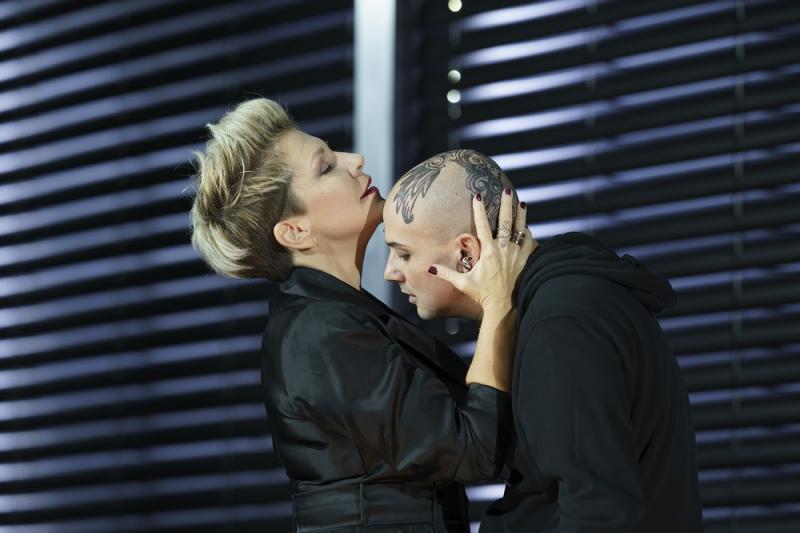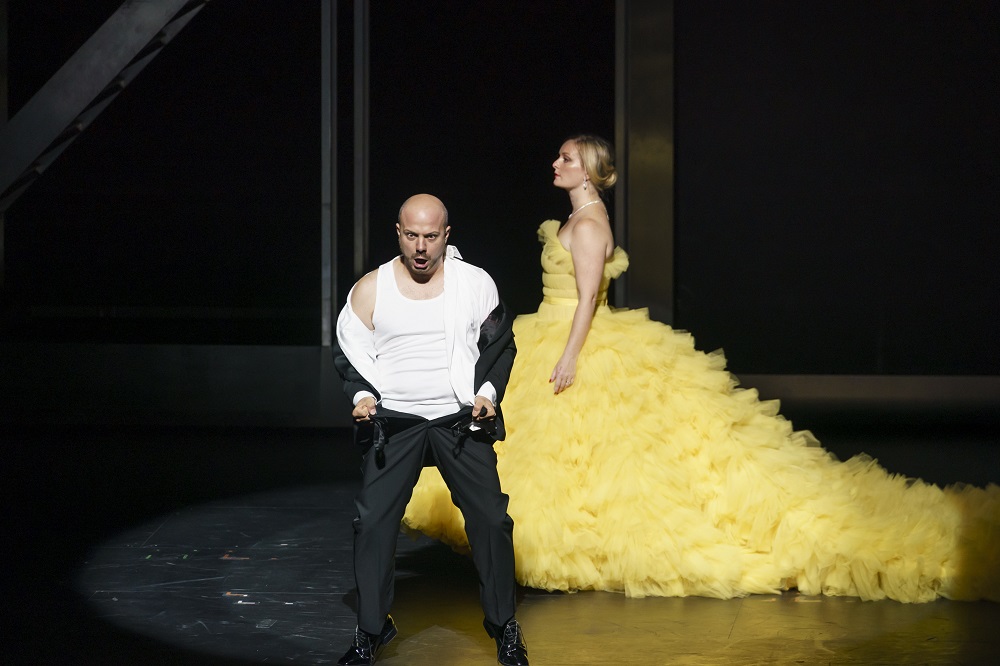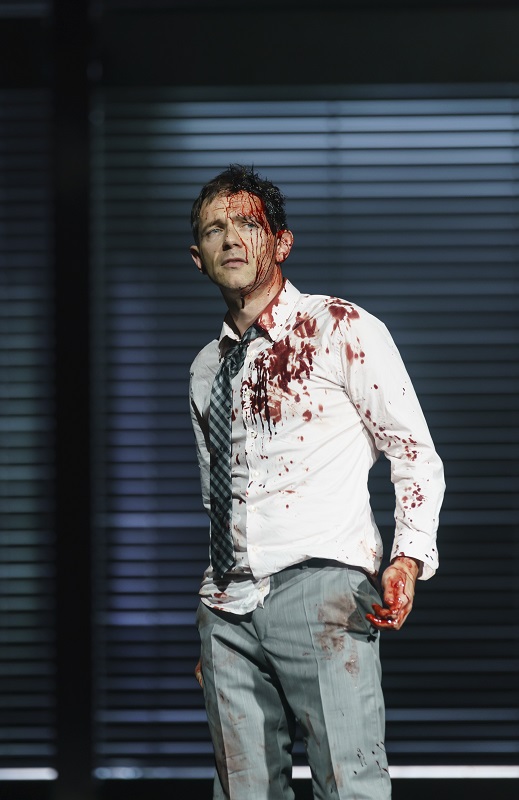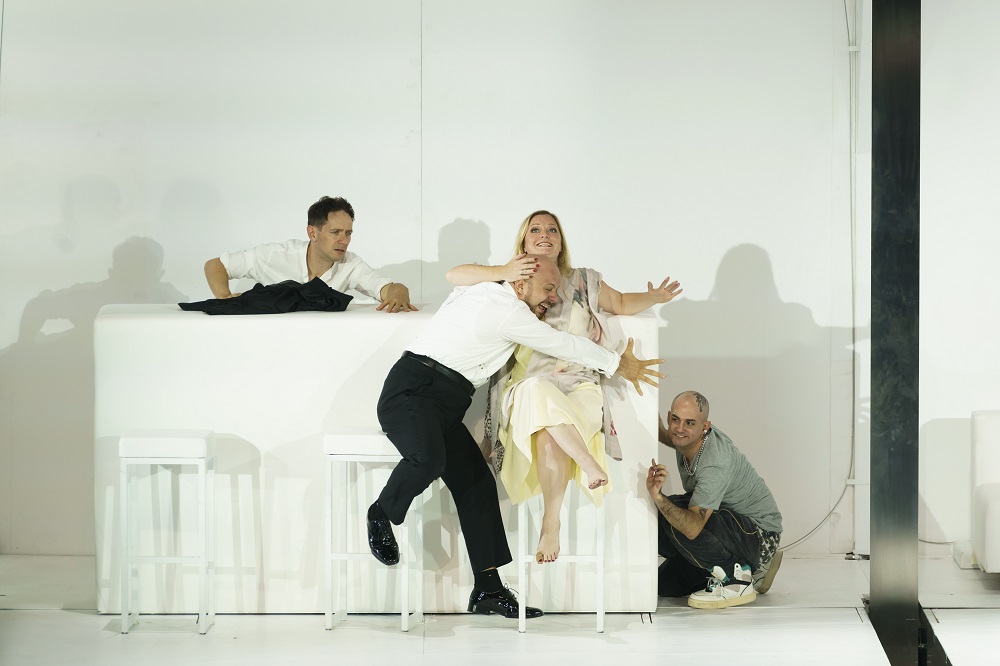Agrippina, Royal Opera review - carry on up the Campidoglio | reviews, news & interviews
Agrippina, Royal Opera review - carry on up the Campidoglio
Agrippina, Royal Opera review - carry on up the Campidoglio
Vamping, stamping and men-babies on stage, a capricious beast in the pit

It was said of the Venetian audiences randy for the satirical antique of Handel's first great operatic cornucopia in 1709 that "a stranger who should have seen the manner in which they were affected, would have imagined they were all distracted".
Not that there isn't much splendid singing and playing to enjoy. Maybe it's even appropriate that excess is the keynote of Joyce DiDonato's Agrippina, fierce to the point of insanity in getting her understandably troubled son Nerone pronounced Caesar. She can command that not always grounded technique to sear with high imperial dudgeon, and to relish the microphone Kosky gives her for the da capo of her big show number in the follow-spot, but not always to convince in the great scena of self-doubt, "Pensieri, voi mi tormentate" ("Thoughs, you torment me") or to sustain a line quite as smoothly as it needs in the convincing appeal to husband Claudio (true bass Gianluca Buratto, authoritative and game to look foolish in states of undress).  Maximilian Emelyanchev commands a tiger to act as Agrippina's sometime daemon in the shape of the Orchestra of the Age of Enlightenment, but it's not always bent to the will of the singers. Kosky's idea to conclude not with the appearance of Juno with nuptial blessing and a ballet but with a soulful, oboe-led movement from Handel's L'Allegro, Il Penseroso ed il Moderato to show one imagined aftermath of Agrippina's Pyrrhic victory is a strong one, though, and movingly executed.
Maximilian Emelyanchev commands a tiger to act as Agrippina's sometime daemon in the shape of the Orchestra of the Age of Enlightenment, but it's not always bent to the will of the singers. Kosky's idea to conclude not with the appearance of Juno with nuptial blessing and a ballet but with a soulful, oboe-led movement from Handel's L'Allegro, Il Penseroso ed il Moderato to show one imagined aftermath of Agrippina's Pyrrhic victory is a strong one, though, and movingly executed.
Soprano Poppea, quick to learn the ways of the older woman's manipulations in a men's world, has the more consistently attractive and memorable music. Lucy Crowe (pictured above with Gianluca Buratto) was first among equals in David McVicar's consistently stylish and funny English National Opera production 12 years ago; here her only pareil, appropriately, is Iestyn Davies as Ottone, the man Poppea truly loves (if only for the duration of the opera). Poppea's music is vivacious and showy; Crowe has all the brilliance of coloratura it needs, but pushed beyond the bounds of dramatic necessity to stamp, twirl, hair-flick and the like - there are at least a dozen hip-wiggles too many - she risks undoing her good work and getting slightly out of sync with the orchestra (though as I've suggested, Emelyanchev doesn't help).
 Ottone is more grounded, and Kosky is right to end the first half on one of the few more extended numbers, "Voi che udite" ("You who hear"), complete with extended accompanied recitative. Its sudden seriousness is well set up by the horseplay-masks torn away in the preceding brutality to a man subject to imperial caprice. Davies (pictured right) sings that as exquisitely as he does the too-brief garden serenade - you want to call it back to linger, but the Handel of Agrippina is usually halfway to Monteverdian directness in serving a splendid libretto by Cardinal Grimani.
Ottone is more grounded, and Kosky is right to end the first half on one of the few more extended numbers, "Voi che udite" ("You who hear"), complete with extended accompanied recitative. Its sudden seriousness is well set up by the horseplay-masks torn away in the preceding brutality to a man subject to imperial caprice. Davies (pictured right) sings that as exquisitely as he does the too-brief garden serenade - you want to call it back to linger, but the Handel of Agrippina is usually halfway to Monteverdian directness in serving a splendid libretto by Cardinal Grimani.
Fagioli's fast-vibratoed male soprano, where the trills can't always be told apart from the notes, is more of an acquired taste as Nerone, but he acts the creepy teenager with marvellous rubberiness of movement, especially in the anticipation of sex with Poppea. Eric Jurenas makes little impression as Narciso, Rosenkrantz to the Guildenstern of Andrea Mastroni's Pallante - excellent in his only aria early on, but the knockabout, conjoined with José Coca Loza, of both is oddly unfunny.
It says much, all the same, for the charisma of the performers that they're not dwarfed by the glinting-chrome excesses of Rebecca Ringst's endlessly revolving set, sometimes blindingly lit by Joachim Klein. Yes, there's a staircase with too many runnings up and down it, and alas, the electric raisings and lowerings of blinds are not silent.  Like the physical gags, the mechanical movements are excessive and often pointless, though the black and white is nicely and more sparingly counterpointed with sassy splashes of colour in the two women's couture (thanks, Klaus Bruns, especially for Poppea's yellow frilly number). The blindingly white penthouse suite in which Poppea must play off her would-be lovers looks set for top-notch bedroom farce (pictured above), but that doesn't quite deliver. In this production, the biggest laughs are reserved for a wonky doorbell. Not Kosky's finest three-and-a-half hours, then, but there's time for the overacting to be toned down, and as it is the singing delivers often enough to make this worth a visit.
Like the physical gags, the mechanical movements are excessive and often pointless, though the black and white is nicely and more sparingly counterpointed with sassy splashes of colour in the two women's couture (thanks, Klaus Bruns, especially for Poppea's yellow frilly number). The blindingly white penthouse suite in which Poppea must play off her would-be lovers looks set for top-notch bedroom farce (pictured above), but that doesn't quite deliver. In this production, the biggest laughs are reserved for a wonky doorbell. Not Kosky's finest three-and-a-half hours, then, but there's time for the overacting to be toned down, and as it is the singing delivers often enough to make this worth a visit.
- Agrippina at the Royal Opera until 11 October
- David Nice's Opera in Depth course at Pushkin House, Bloomsbury Square, starts again on 7 October with three Monday afternoons on Agrippina. Further details here.
- Read more opera reviews on theartsdesk
rating
Explore topics
Share this article
Add comment
The future of Arts Journalism
You can stop theartsdesk.com closing!
We urgently need financing to survive. Our fundraising drive has thus far raised £49,000 but we need to reach £100,000 or we will be forced to close. Please contribute here: https://gofund.me/c3f6033d
And if you can forward this information to anyone who might assist, we’d be grateful.

Subscribe to theartsdesk.com
Thank you for continuing to read our work on theartsdesk.com. For unlimited access to every article in its entirety, including our archive of more than 15,000 pieces, we're asking for £5 per month or £40 per year. We feel it's a very good deal, and hope you do too.
To take a subscription now simply click here.
And if you're looking for that extra gift for a friend or family member, why not treat them to a theartsdesk.com gift subscription?
more Opera
 Albert Herring, English National Opera review - a great comedy with depths fully realised
Britten’s delight was never made for the Coliseum, but it works on its first outing there
Albert Herring, English National Opera review - a great comedy with depths fully realised
Britten’s delight was never made for the Coliseum, but it works on its first outing there
 Carmen, English National Opera review - not quite dangerous
Hopes for Niamh O’Sullivan only partly fulfilled, though much good singing throughout
Carmen, English National Opera review - not quite dangerous
Hopes for Niamh O’Sullivan only partly fulfilled, though much good singing throughout
 Giustino, Linbury Theatre review - a stylish account of a slight opera
Gods, mortals and monsters do battle in Handel's charming drama
Giustino, Linbury Theatre review - a stylish account of a slight opera
Gods, mortals and monsters do battle in Handel's charming drama
 Susanna, Opera North review - hybrid staging of a Handel oratorio
Dance and signing complement outstanding singing in a story of virtue rewarded
Susanna, Opera North review - hybrid staging of a Handel oratorio
Dance and signing complement outstanding singing in a story of virtue rewarded
 Ariodante, Opéra Garnier, Paris review - a blast of Baroque beauty
A near-perfect night at the opera
Ariodante, Opéra Garnier, Paris review - a blast of Baroque beauty
A near-perfect night at the opera
 Cinderella/La Cenerentola, English National Opera review - the truth behind the tinsel
Appealing performances cut through hyperactive stagecraft
Cinderella/La Cenerentola, English National Opera review - the truth behind the tinsel
Appealing performances cut through hyperactive stagecraft
 Tosca, Royal Opera review - Ailyn Pérez steps in as the most vivid of divas
Jakub Hrůša’s multicoloured Puccini last night found a soprano to match
Tosca, Royal Opera review - Ailyn Pérez steps in as the most vivid of divas
Jakub Hrůša’s multicoloured Puccini last night found a soprano to match
 Tosca, Welsh National Opera review - a great company reduced to brilliance
The old warhorse made special by the basics
Tosca, Welsh National Opera review - a great company reduced to brilliance
The old warhorse made special by the basics
 BBC Proms: The Marriage of Figaro, Glyndebourne Festival review - merriment and menace
Strong Proms transfer for a robust and affecting show
BBC Proms: The Marriage of Figaro, Glyndebourne Festival review - merriment and menace
Strong Proms transfer for a robust and affecting show
 BBC Proms: Suor Angelica, LSO, Pappano review - earthly passion, heavenly grief
A Sister to remember blesses Puccini's convent tragedy
BBC Proms: Suor Angelica, LSO, Pappano review - earthly passion, heavenly grief
A Sister to remember blesses Puccini's convent tragedy
 Orpheus and Eurydice, Opera Queensland/SCO, Edinburgh International Festival 2025 review - dazzling, but distracting
Eye-popping acrobatics don’t always assist in Gluck’s quest for operatic truth
Orpheus and Eurydice, Opera Queensland/SCO, Edinburgh International Festival 2025 review - dazzling, but distracting
Eye-popping acrobatics don’t always assist in Gluck’s quest for operatic truth
 MARS, Irish National Opera review - silly space oddity with fun stretches
Cast, orchestra and production give Jennifer Walshe’s bold collage their all
MARS, Irish National Opera review - silly space oddity with fun stretches
Cast, orchestra and production give Jennifer Walshe’s bold collage their all

Comments
I thought by Coskie standards
There's excess in a good way
There's excess in a good way - Kosky at his best - and then there's self-indulgence, which for me is why it wasn't funny. The serious bits, as I've stated, were fine.
Good review and fair warning.